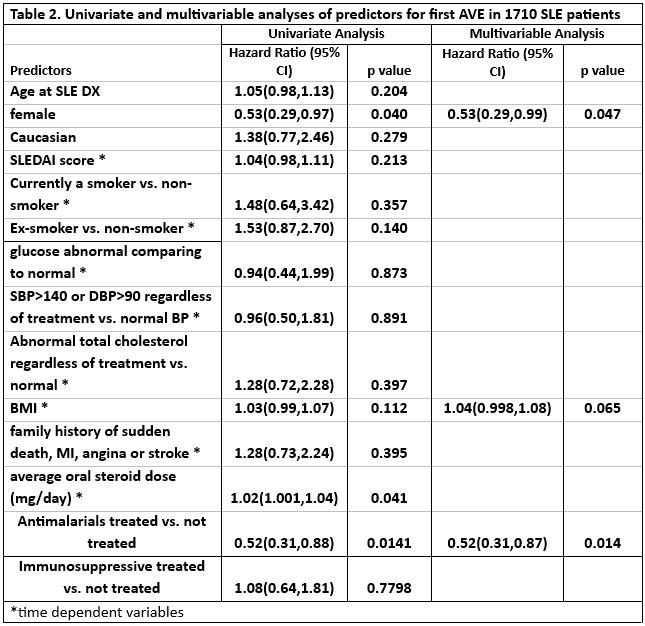Session Information
Session Type: Poster Session (Monday)
Session Time: 9:00AM-11:00AM
Background/Purpose: The prevalence of atherosclerotic vascular events (AVE) in published literature of an inception cohort with SLE is 10%. We aimed to investigate the accrual and the associated factors of AVE in a multinational multiethnic inception cohort of patients with SLE.
Methods: A large 33-centre multinational inception cohort of SLE patients was followed yearly according to a standardized protocol between 1999-2017. Patients (≥4 ACR criteria) entered the cohort within 15 months of SLE diagnosis. Patients with at least one follow-up visit after enrolment were identified. AVEs were collected and attributed on a specialized form. Diagnosis of AVE was confirmed using standard clinical criteria, relevant laboratory data and imaging. Attribution to atherosclerosis (AS) was made on the basis of SLE being inactive at the time of the event, and/or the presence of typical AS changes on imaging or pathology and/or evidence of AS elsewhere. Analysis included descriptive statistics, prevalence, rate of AVE’s per 1000 patient-years of follow-up and univariable / multivariable time-dependent survival regressions.
Results: Of the 1848 patients enrolled in the cohort, 1710 who had at least one follow up visit and comprised the study sample. 88.6% were female, 49.4% Caucasian, 16.4% Black, 15.0% Asian, 15.5% Hispanic and 3.7% other. At enrolment mean (SD) disease duration was 5.7 ± 4.2 months, age rolment was 35.2 ± 13.4 years and SLEDAI-2K was 5.4 ± 5.4. The prevalence of AVEs was 3.6% and the rate per 1000-patient years was 4.6. Sixty-one patients had atherosclerotic events after enrolment (Table 1). Univariate time-dependent Cox regression revealed the predictive factors for AVE were female sex, average steroid dose and antimalarial treatment. Multivariable analyses confirmed female gender had an independent protective effect [hazard ratio and 95% confidence interval [HR (95%CI)] [0.531 (0.288, 0.992)], as did antimalarial treatment [0.517 (0.306, 0.874)] (Table 2). Since only 1305 patients had been tested for antiphospholipid antibodies (APLA) this analysis was repeated in those patients with APLA results. In these patients in the multivariable analysis female sex and antimalarial therapy were protective and APLA, SLEDAI-2K and BMI were predictive (results not shown).
Conclusion: The prevalence of AVE in this study is much lower than previously published data. Female sex and antimalarials were protective for AVE. In patients with APLA similar factors were protective but the APLA, SLEDAI-2K and BMI were predictive for AVE. In clinical practice all classic risk factors should be monitored and treated as they are in the general population.
To cite this abstract in AMA style:
Urowitz M, Gladman D, Su J, Farewell V, Sanchez-Guerrero J, Romero-Diaz J, Bae S, Fortin P, Nived O, Clarke A, Bernatsky S, Gordon C, Hanly J, Wallace D, Isenberg D, Rahman A, Merrill J, Ginzler E, Alarcon G, Petri M, Bruce I, Khamashta M, Aranow C, Manzi S, Dooley M, Ramsey-Goldman R, Jönsen A, Steinsson K, Zoma A, Ruiz-Irastorza G, Lim S, Kalunian K, Inanc M, van Vollenhoven R, Ramos M, Kamen D, Jacobsen S, Peschken C, Askanase A, Stoll T. Incidence and Predictors of Atherosclerotic Vascular Events in a Multicentre Inception SLE Cohort [abstract]. Arthritis Rheumatol. 2019; 71 (suppl 10). https://acrabstracts.org/abstract/incidence-and-predictors-of-atherosclerotic-vascular-events-in-a-multicentre-inception-sle-cohort/. Accessed .« Back to 2019 ACR/ARP Annual Meeting
ACR Meeting Abstracts - https://acrabstracts.org/abstract/incidence-and-predictors-of-atherosclerotic-vascular-events-in-a-multicentre-inception-sle-cohort/


